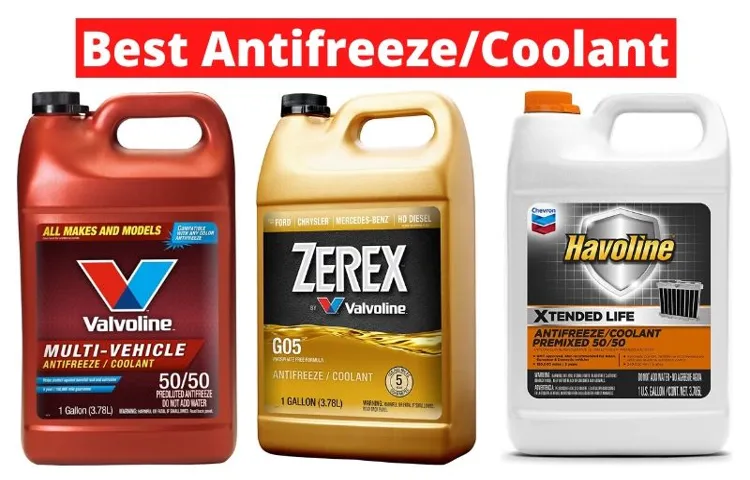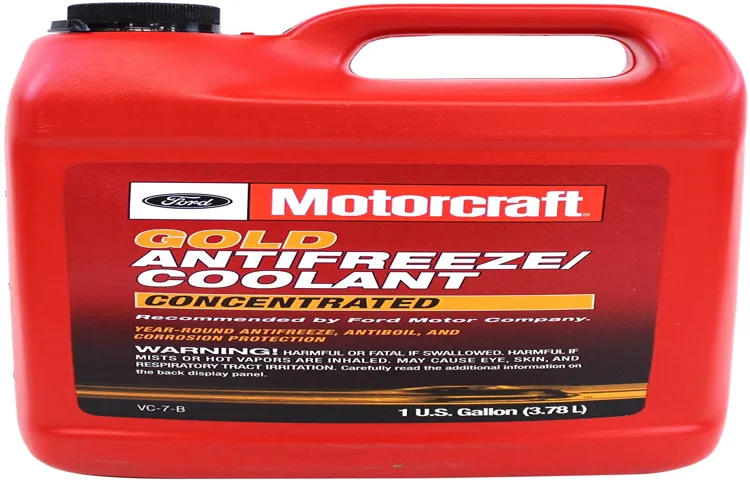If you have ever owned a car or any vehicle for that matter, you have probably heard the term “antifreeze coolant” quite often. But what exactly is antifreeze coolant and why is it so important for your vehicle? Well, think of it as a superhero that protects your engine from freezing in cold temperatures or overheating in hot weather. Just like how we need warm clothes in winter and a cool drink on a scorching day, your vehicle’s engine needs antifreeze coolant to maintain its optimal temperature and prevent any damages.
So let’s dive in and explore the world of antifreeze coolant to better understand its essential role in keeping your vehicle running smoothly.
Table of Contents
- 1 Definition of Antifreeze Coolant
- 2 How Antifreeze Coolant works
- 3 Common uses of Antifreeze Coolant
- 4 Preventing Freezing
- 5 Protecting Against Corrosion
- 6 Maintaining Optimal Operating Temperatures
- 7 Ethylene Glycol-based Antifreeze Coolant
- 8 Propylene Glycol-based Antifreeze Coolant
- 9 Handling and Storage
- 10 Proper Disposal
- 11 Potential Risks and Health Hazards
- 12 Conclusion
- 13 FAQs
Definition of Antifreeze Coolant
Antifreeze coolant is a fluid that is used in a vehicle’s cooling system to regulate the temperature of the engine and prevent it from overheating. It is typically made up of a mixture of water and ethylene glycol, along with other additives that help improve its performance. But have you ever wondered why antifreeze coolant is important for your vehicle? Well, think of it like this: just as you would wear a jacket in cold weather to keep warm, your engine needs antifreeze coolant to help it stay cool.
It works by absorbing heat from the engine and then dissipating it through the radiator. Without antifreeze coolant, your engine would be much more susceptible to overheating, which can lead to serious damage and expensive repairs. So, next time you check your vehicle’s fluids, make sure to top up the antifreeze coolant to keep your engine running smoothly.
How Antifreeze Coolant works
Antifreeze coolant is an essential component in keeping our vehicles running smoothly, especially during the colder months. But what exactly is antifreeze coolant used for? Well, it’s all in the name. Antifreeze coolant is designed to lower the freezing point of the liquid in your vehicle’s cooling system.
This is crucial because when water freezes, it expands, which can lead to cracked engine blocks, radiator damage, and other costly repairs. By adding antifreeze coolant to the water in our engine’s cooling system, we can prevent freezing and ensure that our engines remain in top shape. Additionally, antifreeze coolant also serves to raise the boiling point of the liquid, allowing for efficient heat transfer and preventing the engine from overheating.
So, the next time you’re wondering why your vehicle needs antifreeze coolant, remember that it’s not just about keeping the engine warm in winter – it’s also about protecting it from potential damage caused by freezing temperatures.

Common uses of Antifreeze Coolant
Antifreeze coolant is a key component in the functioning of a vehicle’s cooling system. It is primarily used to regulate the temperature of the engine and prevent it from overheating. This is especially important during extreme cold or hot weather conditions.
Antifreeze coolant works by circulating through the engine and absorbing heat. It then transports this heat to the radiator, where it is released into the surrounding air. In addition to its temperature-regulating properties, antifreeze coolant also helps prevent the engine from freezing in low temperatures.
This is achieved through the use of additives that lower the freezing point of the coolant. By preventing the formation of ice inside the engine, antifreeze coolant ensures that key components, such as the radiator and water pump, can continue to function properly. Overall, antifreeze coolant is a crucial component in maintaining the performance and longevity of a vehicle’s engine.
So, the next time you see that colorful liquid in your radiator, remember the important role it plays in keeping your engine cool and protected.
Do you know why antifreeze coolant is so important for your vehicle? It may seem like just another maintenance item, but it plays a vital role in keeping your engine running smoothly and preventing costly damage. Think of antifreeze coolant as the superhero of your engine, protecting it from extreme temperatures and corrosion. Imagine your car’s engine as a well-oiled machine, constantly generating heat as it powers your vehicle.
Without proper cooling, this heat can quickly become a destructive force, leading to engine failure. That’s where antifreeze coolant comes in. Antifreeze coolant is a specially formulated liquid that circulates through your engine, absorbing heat and transferring it to the radiator for dissipation.
Essentially, it works like a cooling system, regulating the engine temperature and preventing it from overheating. But antifreeze coolant does more than just cool your engine. It also acts as a protective barrier, preventing corrosion and rust from forming within the engine.
Corrosion can cause serious damage, leading to leaks, blockages, and reduced efficiency. Antifreeze coolant contains additives that inhibit rust and corrosion, keeping your engine running smoothly and extending its lifespan. Another crucial role of antifreeze coolant is preventing freezing in cold weather conditions.
As the name suggests, antifreeze coolant contains chemicals that lower the freezing point of water. This is essential in preventing the coolant from solidifying and potentially causing damage to your engine and cooling system. So, the next time you’re tempted to skip that routine coolant check or flush, remember just how important antifreeze coolant is for your vehicle’s overall health.
From keeping your engine cool to preventing corrosion and freezing, it plays a crucial role in maintaining optimal performance and extending your engine’s lifespan. Don’t underestimate the power of this simple yet essential maintenance item. Your engine will thank you.
Preventing Freezing
Antifreeze coolant is a crucial component for preventing freezing in vehicles. But what exactly is it used for? Well, think of antifreeze coolant as a protector for your engine, guarding it against the harsh temperatures of winter. When the temperature drops below freezing, water can turn into ice, causing damage to the engine block and other vital components.
Antifreeze coolant contains additives that lower the freezing point and raise the boiling point of the liquid in the cooling system. This allows the engine to operate at a safe temperature throughout the year, regardless of external conditions. So, if you want to keep your engine running smoothly and prevent freezing in the winter months, make sure you have the right amount of antifreeze coolant in your vehicle.
It’s like having a warm blanket for your engine, keeping it cozy and protected against the cold.
Protecting Against Corrosion
Antifreeze coolant is a vital component in protecting your vehicle against corrosion. But what exactly is it used for? Well, antifreeze coolant is a fluid that helps regulate the temperature of your engine and prevents it from freezing or overheating. It also plays a crucial role in preventing corrosion within the cooling system.
You see, the cooling system of your vehicle is made up of various metals, such as aluminum and iron. Over time, these metals can corrode when exposed to oxygen and water. This corrosion can lead to leaks, blockages, and overall poor performance of the cooling system.
Antifreeze coolant contains corrosion inhibitors, which create a protective barrier on the metal surfaces, preventing any corrosion from occurring. By using antifreeze coolant, you can ensure that your engine stays cool and corrosion-free, leading to a longer lifespan for your vehicle. So, next time you’re topping up your coolant, remember that it’s not just about preventing freezing or overheating, but also protecting against corrosion.
Maintaining Optimal Operating Temperatures
Antifreeze coolant plays a crucial role in maintaining optimal operating temperatures for engines. It is a specially formulated fluid that is added to the cooling system of a vehicle or machine. But what exactly is antifreeze coolant used for? Well, it serves multiple purposes.
First and foremost, antifreeze coolant helps prevent the engine from freezing in cold temperatures. By lowering the freezing point of the water in the cooling system, it ensures that the engine starts and runs smoothly even in extreme cold weather conditions. Additionally, antifreeze coolant also helps in preventing overheating of the engine.
It does this by raising the boiling point of the water in the cooling system, allowing the engine to operate at high temperatures without the risk of boiling over. This is particularly important during the summer months or in hot climates where engines can easily overheat. So, next time you wonder why antifreeze coolant is important, remember that it helps keep your engine running smoothly in both extreme cold and hot weather conditions.
Hey there! Have you ever wondered what keeps your car’s engine from overheating? Well, the answer lies in a magical potion called antifreeze coolant. Okay, maybe it’s not exactly magical, but it does play a crucial role in maintaining your engine’s temperature and preventing it from freezing in colder temperatures. So, what exactly is antifreeze coolant and what types are out there? In this blog, we’ll dive into this fascinating topic and explore the different types of antifreeze coolant available in the market.
Whether you’re a car enthusiast or just someone looking to learn more about how your vehicle works, this blog is for you! So, let’s rev our engines and get started!
Ethylene Glycol-based Antifreeze Coolant
Antifreeze coolant is a vital component in ensuring the smooth operation of a vehicle’s engine, especially in colder climates. It is used to regulate the temperature of the engine by preventing the coolant from freezing in extreme cold or overheating in hot weather. But what exactly is antifreeze coolant and why is it necessary? Antifreeze coolant, specifically ethylene glycol-based coolant, is a mixture of water and chemicals that helps maintain the optimal temperature of the engine by absorbing excess heat.
It acts as a heat transfer fluid, carrying heat away from the engine and dissipating it through the radiator. This helps prevent the engine from overheating and potentially suffering severe damage. Additionally, antifreeze coolant also provides protection against corrosion and rust by lubricating the internal parts of the engine.
It is essential to check and maintain the coolant levels regularly to ensure the proper functioning of the engine and prolong its lifespan. So, next time you’re driving in freezing temperatures or scorching summer heat, remember the importance of antifreeze coolant in keeping your engine running smoothly.
Propylene Glycol-based Antifreeze Coolant
Antifreeze coolant is a crucial component in maintaining the optimal performance and longevity of our vehicles. But what exactly is it used for? Well, antifreeze coolant serves multiple purposes. Firstly, it prevents the engine from freezing in extremely cold temperatures by lowering the freezing point of the coolant.
This ensures that the engine remains functional even in subzero conditions. Additionally, antifreeze coolant also helps regulate the engine’s operating temperature by absorbing excess heat produced during combustion. By doing so, it prevents the engine from overheating and ensures that it operates efficiently.
Think of antifreeze coolant as the engine’s bodyguard, protecting it from the harsh winter chill or the scorching summer heat. So, the next time you wonder about the importance of antifreeze coolant, remember that it is more than just a colorful liquid in your radiator – it is a vital component that keeps your engine running smoothly all year round.
Have you ever wondered about the safety considerations when using antifreeze coolant in your vehicle? Antifreeze coolant is a crucial component in maintaining the proper functioning of your vehicle’s engine, especially during colder months. However, it is important to handle and use antifreeze coolant with care, as it can be potentially harmful if not properly managed. One of the key safety considerations when using antifreeze coolant is its toxicity.
Most antifreeze coolants contain ethylene glycol, a chemical compound that is highly toxic if ingested. This is particularly concerning, as ethylene glycol has a sweet taste that can attract both humans and animals. Ingesting even a small amount of antifreeze coolant can lead to severe health issues, including kidney damage and even death.
To ensure safety, it is crucial to store antifreeze coolant in a secure location, away from children and pets. Additionally, any spills or leaks should be cleaned up immediately, as even small amounts of antifreeze coolant can pose a risk. Another safety consideration when using antifreeze coolant is its flammability.
Antifreeze coolant is highly flammable and can ignite at relatively low temperatures. It is vital to handle and store antifreeze coolant away from heat sources, open flames, and sparks. Smoking should also be avoided when working with antifreeze coolant, as a single spark can lead to a catastrophic fire.
In addition, it is important to be aware of the environmental impact of antifreeze coolant. Improper disposal of antifreeze coolant can contaminate soil and water sources, posing a threat to wildlife and the ecosystem. It is essential to dispose of antifreeze coolant in accordance with local regulations and guidelines to prevent any harm to the environment.
In conclusion, while antifreeze coolant is a necessary component for maintaining your vehicle’s engine performance, it is crucial to handle and use it with caution. The toxicity, flammability, and environmental impact of antifreeze coolant make it important for proper storage, disposal, and cleanup procedures to be followed. By prioritizing safety considerations, you can ensure the well-being of both yourself and the environment.
Handling and Storage
So, you may be wondering, what is antifreeze coolant used for? Well, let me break it down for you. Antifreeze coolant is a liquid that is used in the cooling system of your car or any other internal combustion engine. Its main purpose is to regulate the temperature of the engine and prevent it from overheating or freezing in extreme weather conditions.
This is achieved by a clever mix of chemicals that alter the freezing and boiling points of water. In the winter, antifreeze coolant prevents the water in your engine from freezing, which could cause serious damage. And in the summer, it helps to dissipate the heat generated by the engine, keeping it running smoothly.
So, the next time you see that colorful liquid being poured into your car’s radiator, you’ll know exactly why it’s there – to keep your engine happy and healthy!
Proper Disposal
Antifreeze coolant is a vital component in a vehicle’s cooling system, as it helps to regulate and maintain the engine’s temperature. It prevents the engine from overheating in hot weather and helps to keep it from freezing in cold temperatures. But did you know that antifreeze coolant also has another important purpose? It helps to prevent corrosion and rust within the engine by lubricating and protecting the various metal components.
This is especially crucial in older vehicles that may have metal parts that are more susceptible to rust. So, next time you are checking your car’s fluids, don’t forget about the importance of having the right amount of antifreeze coolant.
Potential Risks and Health Hazards
Antifreeze coolant is commonly used in vehicles to regulate engine temperature and prevent freezing or overheating. It is a critical component that helps maintain the optimal operating temperature for the engine. However, it is important to be aware of the potential risks and health hazards associated with antifreeze coolant.
One of the main concerns is its toxicity. Most traditional antifreeze coolants contain ethylene glycol, which is highly poisonous if ingested. This is why it is important to handle and store antifreeze coolant with care, keeping it out of reach of children and pets.
Additionally, ethylene glycol can be harmful to the environment if leaked or disposed of improperly. It can contaminate soil, water sources, and negatively impact wildlife. To mitigate these risks, it is advisable to opt for antifreeze coolants that contain propylene glycol, which is less toxic and more environmentally friendly.
Regularly checking for leaks, proper disposal of old coolant, and following safety guidelines will help minimize any potential risks associated with antifreeze coolant usage.
Conclusion. It’s the end of the road, the final chapter, the ultimate destination. But what does it really mean? How do we wrap up our thoughts, tie everything together, and leave our readers with a lasting impression? The conclusion is a critical part of any piece of writing, whether it’s an essay, a blog post, or a novel.
It’s your last chance to make a statement, to leave your mark, and to leave your readers satisfied. So how do you write a conclusion that hits all the right notes? In this blog post, we’ll explore what a conclusion is, why it’s important, and how to write one that ties your whole piece together. Let’s get started!
Conclusion
In conclusion, antifreeze coolant is like the guardian angel of your vehicle’s engine. It swoops in to save the day, protecting your engine from frigid temperatures and the scorching heat of the summer. Just imagine it as your engine’s personal superhero, keeping it cool when things get hot and preventing it from turning into a frozen popsicle when winter comes knocking.
So next time you’re cruising down the road, remember to give a nod of gratitude to the trusty antifreeze coolant running through your vehicle’s veins. It’s the unsung hero that keeps your engine running smoothly, giving you the peace of mind to focus on the road ahead, knowing that your engine is safe and sound. So, raise a glass of coolant (figuratively, of course) in honor of this unsung automotive champion!”
FAQs
What is antifreeze coolant used for?
Antifreeze coolant is used to prevent the engine coolant from freezing in cold temperatures and boiling in hot temperatures. It also helps in maintaining the engine’s temperature and preventing corrosion or rust in the cooling system.
How does antifreeze coolant work?
Antifreeze coolant works by raising the boiling point and lowering the freezing point of the engine coolant. It contains chemicals, usually ethylene glycol or propylene glycol, which help in regulating the temperature and preventing the coolant from freezing or boiling.
Is it necessary to use antifreeze coolant in all climates?
While antifreeze coolant is essential in colder climates to prevent the coolant from freezing, it is also beneficial in warmer climates to increase the boiling point of the coolant. Using antifreeze coolant ensures optimal engine performance and prevents overheating.
Can I use water instead of antifreeze coolant?
Using water instead of antifreeze coolant is not recommended because water can freeze at low temperatures and boil at high temperatures, leading to engine damage. Antifreeze coolant provides better temperature regulation and prevents corrosion.
How often should antifreeze coolant be replaced?
The recommended interval for replacing antifreeze coolant varies depending on the type of coolant and the vehicle manufacturer’s guidelines. Generally, it is recommended to replace coolant every 2-5 years or every 30,000-50,000 miles.
Can I mix different types of antifreeze coolant?
Mixing different types of antifreeze coolant can cause chemical reactions and potentially damage the cooling system. It is best to use the same type of coolant recommended by your vehicle manufacturer and avoid mixing different brands or types.
Can antifreeze coolant be harmful to the environment?
Antifreeze coolant can be toxic to humans and animals if ingested. It is important to handle and dispose of antifreeze coolant properly to avoid environmental contamination. Many recycling centers accept used coolant for proper disposal or recycling.



